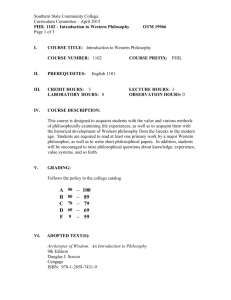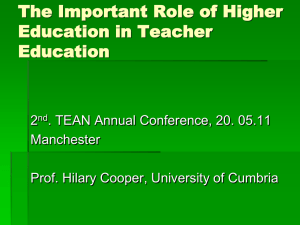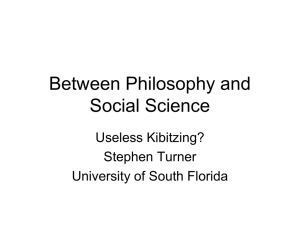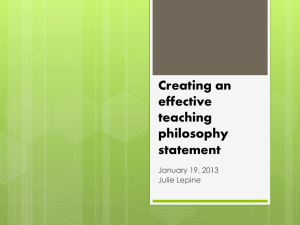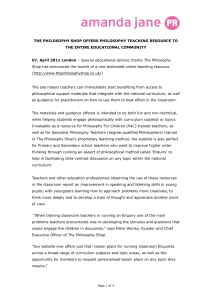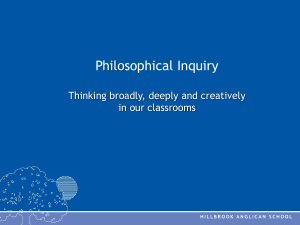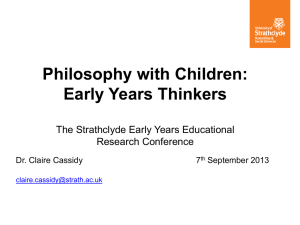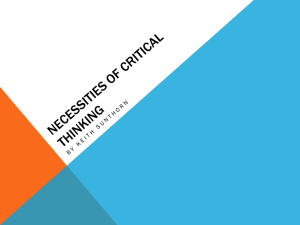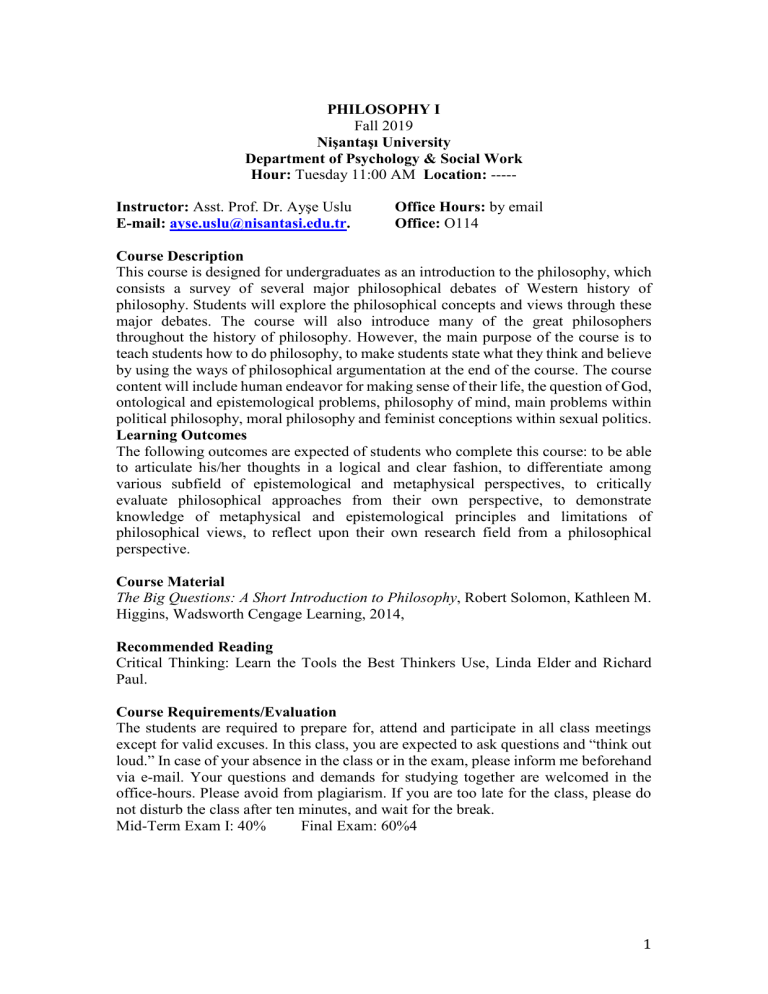
PHILOSOPHY I Fall 2019 Nişantaşı University Department of Psychology & Social Work Hour: Tuesday 11:00 AM Location: ----Instructor: Asst. Prof. Dr. Ayşe Uslu E-mail: ayse.uslu@nisantasi.edu.tr. Office Hours: by email Office: O114 Course Description This course is designed for undergraduates as an introduction to the philosophy, which consists a survey of several major philosophical debates of Western history of philosophy. Students will explore the philosophical concepts and views through these major debates. The course will also introduce many of the great philosophers throughout the history of philosophy. However, the main purpose of the course is to teach students how to do philosophy, to make students state what they think and believe by using the ways of philosophical argumentation at the end of the course. The course content will include human endeavor for making sense of their life, the question of God, ontological and epistemological problems, philosophy of mind, main problems within political philosophy, moral philosophy and feminist conceptions within sexual politics. Learning Outcomes The following outcomes are expected of students who complete this course: to be able to articulate his/her thoughts in a logical and clear fashion, to differentiate among various subfield of epistemological and metaphysical perspectives, to critically evaluate philosophical approaches from their own perspective, to demonstrate knowledge of metaphysical and epistemological principles and limitations of philosophical views, to reflect upon their own research field from a philosophical perspective. Course Material The Big Questions: A Short Introduction to Philosophy, Robert Solomon, Kathleen M. Higgins, Wadsworth Cengage Learning, 2014, Recommended Reading Critical Thinking: Learn the Tools the Best Thinkers Use, Linda Elder and Richard Paul. Course Requirements/Evaluation The students are required to prepare for, attend and participate in all class meetings except for valid excuses. In this class, you are expected to ask questions and “think out loud.” In case of your absence in the class or in the exam, please inform me beforehand via e-mail. Your questions and demands for studying together are welcomed in the office-hours. Please avoid from plagiarism. If you are too late for the class, please do not disturb the class after ten minutes, and wait for the break. Mid-Term Exam I: 40% Final Exam: 60%4 1 Course Outline Week 1: Introduction: Giving an overall view on the course content, its scope and the method of the course. What is philosophy? The primary features of doing philosophy: Articulation, Argument, synthesis and analysis. The fundamentals of logic. Week 2: What is reality? The distinction between appearance and reality. The problem of Universals. The first metaphysicians and Plato’s forms. The distinction between substance and accidents. Aristotle’s metaphysics. See: 1. Waking Life, Richard Linklater. 2. Examined Life, Astor Taylor. Week 3: Appearance and Reality. Idealism vs. materialism. Teleology. See: The Matrix. Week 4: What is knowledge? How do we know reality? The forms of knowledge. What is true? Rationalism, empiricism, scepticism. The problem of relativism. See: Cosmos: A Spacetime Odyssey Week 5: Introduction to philosophy of science. What is the nature of scientific explanation? The problem of induction. Verifiability and falsifiability. See: Particle Fever (2013). Week 6: The question of God: the philosophical conceptions and the arguments for God. Questioning the grounds for believing. Religious tolerance. See: Through The Warmhole: Is there a creator? Week 7: The philosophy of mind: Behaviourism. Physicalism. Identity Theory of Mind. Functionalism. The problem of Consciousness and qualia. See: The Brain with, David Eagleman 2. Curiosity: mankind rising. Week 8: Midterm Exam I Week 9: What is freedom? The problem of free will and determinism. See: 1. Uçurtmayı Vurmasınlar (Tunç Başaran) 2. Human Resources: Social Engineering in the 20th Century (2010). Week 10: What is moral act? The theories of morality I: duty-defined morality, consequentialist theories of morality, feminist ethics, virtue ethics. See: Human, by Yann Arthus-Bertrand. Week 11: The origins of social contract. Politics. See: 1. Quest for Fire, Jean-Jacques Annaud. 2. 1984, Michael Radford. 3. The Great Dictator, Charles Chaplin. 4. The White Ribbon, M. Haneke. Week 12: What is justice? Theories of social justice. See: 1. Capitalism Is The Crisis (2011) 2. The Corporation, Mark Achbar. 3. Edukators, Hans Weingartner. 4. American History X, Tony Kaye. 5. Davacı, Zeki Ökten. 2 Week 13: Sexual Politics. Feminist philosophy. See: 1. 4 Months, 3 Weeks and 2 Days, Cristian Mungiu. 2. Suffragette. 3. Persepolis. 4. Feminists: What Were They Thinking (belgesel dizi. Week 14: Environmental Ethics See: 1. Growing Change: A Journey Inside Venezuela’s Food Revolution (2011) 2. Food, Inc., Robert Kenner. Week 15: Aesthetics and Philosophy of Art. See: 1. Exit Through the Gift Shop.2. Laerte-se by Lygia Barbosa and Eliane Brum. Week 16: Final Exam 3
